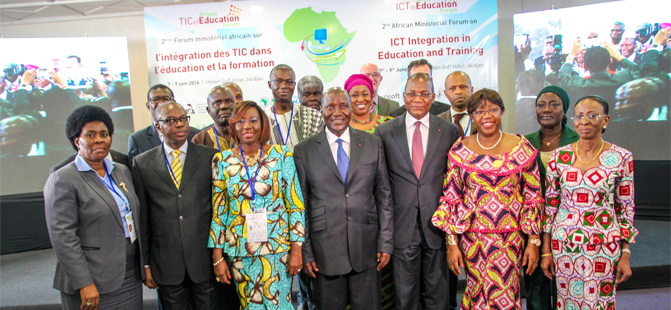- Move from policy to action by developing national and regional strategies and programs, as well as accountability mechanisms matching the ambition of the Global Agenda 2030 and Africa’s Agenda 2063;
- Create an enabling environment for fostering partnerships to accelerate the implementation of ICT integration in education and training systems;
- Accelerate the use of ICT to offer all learners an equal opportunity to access quality education;
- Integrate skilling in digital technologies into all technical and vocational skills development programs;
- Promote youth employment and self-employment through holistic training combining the mastery of the latest technologies, providing support for professionals and an incubation period for the creation of start-ups that include logistical and financial support;
- Establish sustainable financing strategies through the development of partnerships with foundations, technical and financial partners, telecommunication regulators and operators as well as various digital solidarity funds;
- Create multifunctional digital spaces accessible to all the actors of society (pupils, students, youth, women and other economic actors) to support education, health and environments conducive to business;
- Design and deliver learning pathways tailored to the needs of children and young people affected by crises and conflicts as well as to the needs of other marginalized groups;
- Implement mechanisms for prior learning assessment and certification of vocational and technical skills outside formal institutions, so as to promote access to employment, employability and mobility of young people;
- Encourage, through incentives, the creation of training content drawing on indigenous cultures;
- Build technological alliances to ensure that the latest advances in equipment and operating systems are extended to the African continent;
- Provide schools with access to mini-networks and systems to ensure power supply.
End of 2nd Ministerial Forum
The Second African Ministerial Forum on the integration of information and communication technology (ICT) in education and training under the theme: ‘Advancing inclusive knowledge societies in Africa to implement Africa’s Agenda 2063 and the SDGs’ ended June 9 in Abidjan.
GESCI was a major co-organizer of the Forum, partnering with the Government of Côte d’Ivoire through the Ministry of National Education, the Association for the Development of Education in Africa (ADEA), the African Development Bank (AfDB) Group, Intel, the United Nations Educational, Scientific and Cultural Organization (UNESCO), the international Organization of the Francophonie (OIF) and Microsoft to hold this major event.
The Forum ended with a consensus on the urgency of accelerating ICT integration in education and training to develop 21st century skills, advance knowledge society and achieve Africa’s Agenda 2063 and the SDGs.
Governments as well as education and training stakeholders are invited to take the following actions:

